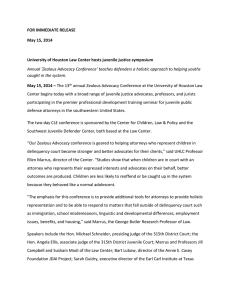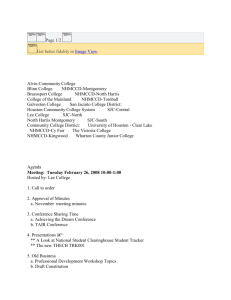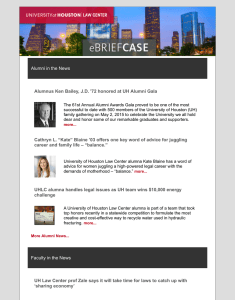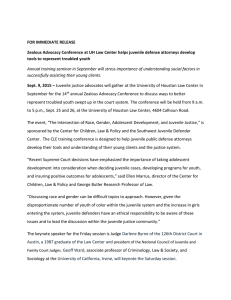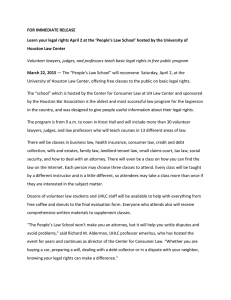FOR IMMMEDIATE RELEASE
advertisement
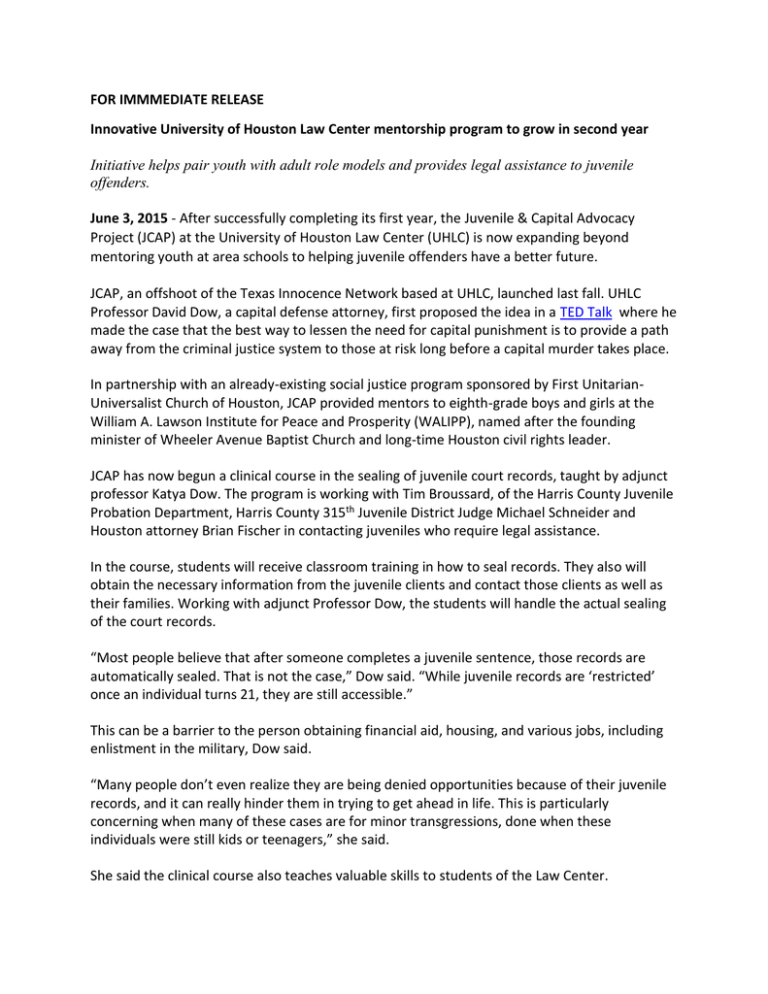
FOR IMMMEDIATE RELEASE Innovative University of Houston Law Center mentorship program to grow in second year Initiative helps pair youth with adult role models and provides legal assistance to juvenile offenders. June 3, 2015 - After successfully completing its first year, the Juvenile & Capital Advocacy Project (JCAP) at the University of Houston Law Center (UHLC) is now expanding beyond mentoring youth at area schools to helping juvenile offenders have a better future. JCAP, an offshoot of the Texas Innocence Network based at UHLC, launched last fall. UHLC Professor David Dow, a capital defense attorney, first proposed the idea in a TED Talk where he made the case that the best way to lessen the need for capital punishment is to provide a path away from the criminal justice system to those at risk long before a capital murder takes place. In partnership with an already-existing social justice program sponsored by First UnitarianUniversalist Church of Houston, JCAP provided mentors to eighth-grade boys and girls at the William A. Lawson Institute for Peace and Prosperity (WALIPP), named after the founding minister of Wheeler Avenue Baptist Church and long-time Houston civil rights leader. JCAP has now begun a clinical course in the sealing of juvenile court records, taught by adjunct professor Katya Dow. The program is working with Tim Broussard, of the Harris County Juvenile Probation Department, Harris County 315th Juvenile District Judge Michael Schneider and Houston attorney Brian Fischer in contacting juveniles who require legal assistance. In the course, students will receive classroom training in how to seal records. They also will obtain the necessary information from the juvenile clients and contact those clients as well as their families. Working with adjunct Professor Dow, the students will handle the actual sealing of the court records. “Most people believe that after someone completes a juvenile sentence, those records are automatically sealed. That is not the case,” Dow said. “While juvenile records are ‘restricted’ once an individual turns 21, they are still accessible.” This can be a barrier to the person obtaining financial aid, housing, and various jobs, including enlistment in the military, Dow said. “Many people don’t even realize they are being denied opportunities because of their juvenile records, and it can really hinder them in trying to get ahead in life. This is particularly concerning when many of these cases are for minor transgressions, done when these individuals were still kids or teenagers,” she said. She said the clinical course also teaches valuable skills to students of the Law Center. “They are receiving hands-on training in how to meet with and obtain information from clients, file pleadings, and appear at hearings on behalf of clients in juvenile courts. This will benefit juveniles by providing a free service to allow them to move forward in their lives without being hampered by a juvenile record,” she said. Meanwhile, JCAP will continue its mentorship program with WALIPP in the 2015-2016 academic year, Professor David Dow said. Last year, JCAP drew from the ranks of the University of Houston undergraduate and UH Law Center student bodies and alumni networks, the Harris County Defense Attorneys Association and other organizations to place mentors with the students. Mentors typically met with students at least once per week during their lunch periods. All volunteers must be 18 years old or older and are asked to make a commitment of at least one year. JCAP will also work with UHLC Professor Ellen Marrus, director of the Center for Children, Law and Policy, and Professor Janet Heppard to develop additional hands-on training for law students interested in working with juveniles, and will continue to work with WALIPP and other community partners, including the Yellowstone School, Change Happens, and the Harris County juvenile bar and bench. For more information or to learn how to volunteer, call 713-743-1011 or visit www.jcaptexas.org. University of Houston Law Center Media Contacts: Carrie Anna Criado, UH Law Center Executive Director of Communications and Marketing, 713-743-2184, cacriado@central.uh.edu; John T. Kling, UH Law Center Communications Manager, 713- 7438298, jtkling@central.uh.edu; or Stephen B. Jablonski, Multimedia Specialist, 713-743- 1634, sbjablon@central.uh.edu. About the University of Houston The University of Houston is a Carnegie-designated Tier One public research university recognized by The Princeton Review as one of the nation's best colleges for undergraduate education. UH serves the globally competitive Houston and Gulf Coast Region by providing world-class faculty, experiential learning and strategic industry partnerships. Located in the nation's fourth-largest city, UH serves more than 40,900 students in the most ethnically and culturally diverse region in the country. About the University of Houston Law Center The University of Houston Law Center is the leading law school in the nation's fourth-largest city. Founded in 1947, it is a top-tier institution awarding Doctor of Jurisprudence (J.D.) and Master of Laws (LL.M.) degrees. The Law Center is fully accredited by the American Bar Association and is a member of the Association of American Law Schools.
